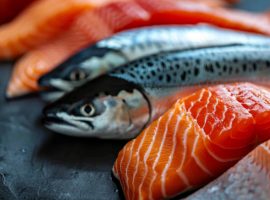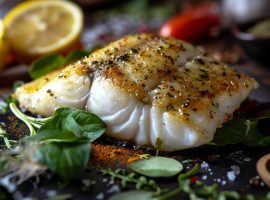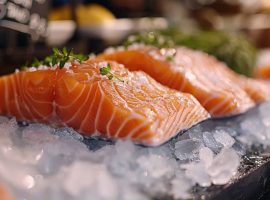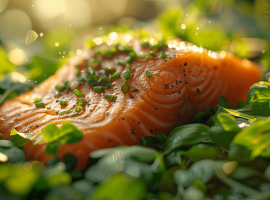Understanding Omega-3 Fatty Acids and Their Sources
Omega-3 fatty acids are essential nutrients vital for maintaining heart health and supporting neurodevelopment. There are three primary types: eicosapentaenoic acid (EPA), docosahexaenoic acid (DHA), and alpha-linolenic acid (ALA). EPA and DHA are primarily found in marine sources, while ALA is typically derived from plant-based foods.
The Essential Nature of Omega-3s
Omega-3 fatty acids are crucial for cardiovascular health, playing a significant role in reducing inflammation and potentially lowering the risk of heart disease. They are also important for cognitive function and may aid in mental health.
Distinguishing EPA, DHA, and ALA
EPA and DHA are known for their anti-inflammatory properties and their role in brain health. ALA, while not as active in the body, is converted into EPA and DHA at low rates and is an important dietary component for those who do not consume fish.
Top Marine Sources of Omega-3s
For those seeking to increase their intake of omega-3s through diet, a variety of fish are known for their high content. Oily fish such as salmon, mackerel, sardines, and anchovies are particularly rich in EPA and DHA. These fish not only contribute to a heart-healthy diet but also support overall wellness with their nutrient-rich profiles.
Cardiovascular and Cognitive Advantages of Omega-3-Rich Fish

Omega-3 fatty acids, particularly eicosapentaenoic acid (EPA) and docosahexaenoic acid (DHA), are pivotal in maintaining cardiovascular health. They contribute to the reduction of triglycerides, mitigate arterial plaque buildup, and can lower blood pressure. Regular intake of omega-3-rich fish like salmon and mackerel correlates with a decreased risk of heart diseases and stroke.
Impact on Brain Function and Mental Health
DHA is abundant in the brain’s neuronal membranes, playing a vital role in cognitive processes and mental health. Omega-3s are linked to improved memory, cognitive flexibility, and potential reduction in the risk of neurodegenerative diseases. They also exhibit mood-stabilising effects, which can be beneficial in managing conditions like depression.
Chronic Disease Risk Reduction
Incorporating omega-3-rich fish into your diet may lower the incidence of chronic diseases. These fatty acids possess anti-inflammatory properties that combat conditions such as rheumatoid arthritis and may also play a role in cancer prevention.
Neurodevelopmental Benefits for All Ages
For children and adults alike, omega-3s support neurodevelopment and brain health. During pregnancy and early childhood, DHA is crucial for visual and cognitive development. For adults, sustained omega-3 intake can aid in preserving brain function and delaying cognitive decline.
Optimal Omega-3 Intake: Oily Fish Recommendations

For those seeking to enhance their omega-3 intake, certain fish stand out as superior sources. Oily fish such as salmon, mackerel, sardines, and anchovies are particularly rich in EPA and DHA, the omega-3 fatty acids that are most beneficial for health. Including these in your diet is an effective way to meet your body’s requirements for these essential nutrients.
White Fish and Omega-3 Content
While not as high in omega-3s as their oily counterparts, white fish like cod and haddock still offer significant benefits. They provide a lean protein source and contain moderate amounts of omega-3 fatty acids, making them a suitable option for those looking to diversify their seafood intake.
Shellfish: An Alternative Omega-3 Source
Shellfish, including oysters and mussels, contribute to omega-3 intake as well. They contain varying levels of EPA and DHA and can be included as part of a balanced diet to ensure adequate omega-3 consumption.
Recommended Fish Consumption for Health
To optimise health benefits, it is recommended that you consume at least two servings of fish per week, particularly varieties high in omega-3 fatty acids. A serving size is typically considered to be about 3.5 ounces cooked, or about cup of flaked fish. This frequency supports cardiovascular health and cognitive function without exposing you to excessive mercury levels.
Navigating Omega-3 Benefits Amidst Mercury Concerns

When incorporating omega-3-rich fish into your diet, it’s essential to consider mercury exposure. Mercury, a heavy metal found in various fish, can have adverse health effects if consumed in large quantities. However, the benefits of omega-3 fatty acids for heart and brain health are substantial, necessitating a balanced approach to fish consumption.
Fish Varieties with Lower Mercury Levels
For frequent consumption, opt for fish with lower mercury levels such as:
These species are typically lower on the food chain and accumulate less mercury, making them safer choices.
Safe Consumption Guidelines for Vulnerable Groups
Vulnerable populations, including pregnant individuals, nursing mothers, and young children, should adhere to specific guidelines to minimise mercury risk while still obtaining omega-3 benefits:
- Limit intake of high-mercury fish like shark, swordfish, king mackerel, and tilefish.
- Consume up to 12 ounces (two average meals) a week of a variety of fish and shellfish that are lower in mercury.
Cooking Methods and Mercury
Cooking does not reduce the mercury content of fish; thus, selecting the right fish is crucial. However, proper cooking techniques can enhance the safety and nutritional value of your seafood. Grilling, broiling, and baking are recommended to preserve omega-3 integrity while ensuring the fish is cooked to safe temperatures.
Marine Stewardship Council Certification: A Mark of Sustainability

The Marine Stewardship Council (MSC) certification is a seal of approval indicating that seafood has been sourced following stringent sustainability standards. MSC-certified products come from fisheries that have been independently assessed for their impact on wild fish populations and the marine environment.
Contribution of Sustainable Fishing to Environmental Conservation
Sustainable fishing practices are designed to minimise the impact on the ecosystem, ensuring that fish populations and their habitats remain healthy for future generations. These practices include responsible catch methods, avoiding overfishing, and protecting vulnerable species.
Economic Implications of Sustainable Seafood Choices
Choosing sustainably sourced fish supports the longevity of the fishing industry and the livelihoods dependent on it. It also encourages the market to shift towards more responsible fishing practices, which can lead to long-term economic stability.
Identifying and Selecting Sustainable Omega-3-Rich Fish
Consumers can identify sustainable omega-3-rich fish by looking for the MSC label on packaging. Additionally, they can consult seafood guides from reputable conservation organisations that provide recommendations on which fish are the best choices for both health and environmental sustainability.
Plant-Based Omega-3 Alternatives for Non-Fish Eaters

For vegetarians, vegans, or those who prefer not to consume fish, there are several plant-based sources of alpha-linolenic acid (ALA), a type of omega-3 fatty acid. These include:
- Flaxseeds and flaxseed oil
- Chia seeds
- Walnuts
- Hemp seeds
- Edamame
- Seaweed and algae
Meeting Omega-3 Requirements Without Fish
To meet omega-3 fatty acid requirements, non-fish eaters can incorporate the above plant sources into their diets. It’s important to note that while the body can convert ALA into EPA and DHA, the conversion rate is low. Therefore, a higher intake of ALA-rich foods is necessary to achieve the same benefits provided by fish-derived omega-3s.
Algae: A Direct Source of EPA and DHA for Vegetarians
Algae stand out as a unique plant source of both EPA and DHA, the same omega-3 fatty acids found in fish. Algae-based supplements are an effective option for those seeking direct sources of these fatty acids without consuming seafood.
Cooking Methods to Preserve Omega-3 Integrity in Plant Foods
While cooking methods do not enhance the omega-3 content in plant foods, certain techniques can help preserve their nutritional value:
- Avoid high-temperature cooking, which can degrade omega-3s.
- Use gentle methods like steaming or cold preparations.
- Store oils rich in omega-3s in dark, cool places to prevent oxidation.
Preserving Omega-3s: Cooking Methods Matter

When preparing omega-3-rich fish, the cooking method can significantly impact the retention of these beneficial fatty acids. To maximise the health benefits, certain techniques are recommended:
Optimal Cooking Techniques for Omega-3 Retention
- Grilling: Provides high heat without direct contact with cooking liquids which can leach out omega-3s.
- Broiling: Similar to grilling, it cooks fish quickly and without the loss of fatty acids.
- Baking: Ensures even cooking and minimal loss of nutrients, making it an excellent method for preserving omega-3 integrity.
Cooking Practices to Avoid
To maintain the highest levels of omega-3s, it is advisable to avoid:
- Deep-frying: High temperatures can degrade omega-3s and add unhealthy fats.
- Overcooking: Can reduce the omega-3 content and overall nutritional value.
Enhancing Omega-3 Benefits with Spices and Marinades
Incorporating certain spices or marinades may not necessarily increase the omega-3 content but can complement the health benefits of fish:
- Turmeric: Contains curcumin, which has anti-inflammatory properties.
- Ginger: Offers antioxidant effects that may support the cardiovascular benefits of omega-3s.
By choosing the right cooking methods and accompaniments, you can ensure that the omega-3-rich fish you consume provides the maximum possible health benefits.
Evaluating the Efficacy of Fish Oil Supplements
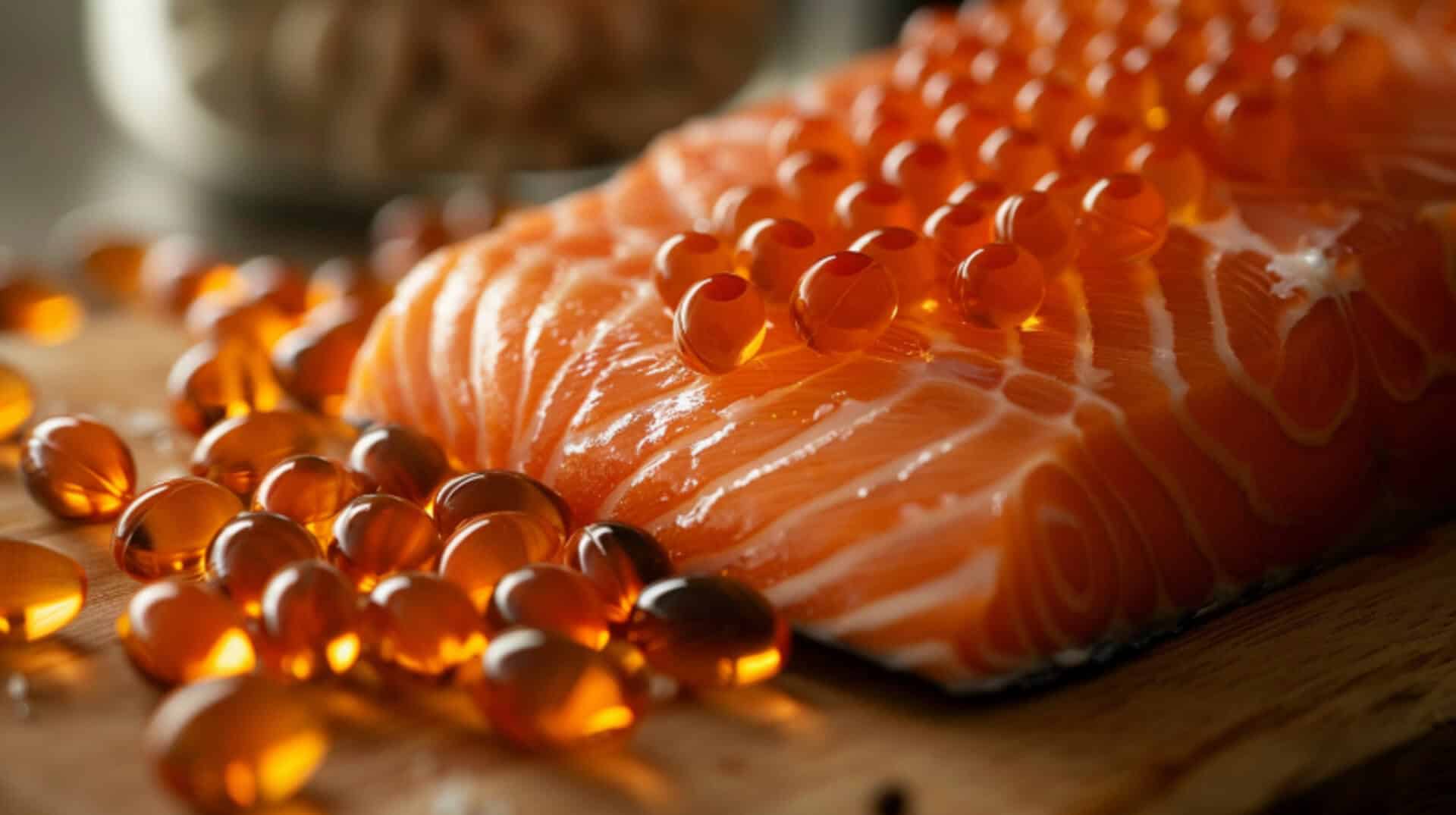
Fish oil supplements are a concentrated source of omega-3 fatty acids, often taken to augment dietary intake. They can be particularly beneficial for individuals who do not consume sufficient amounts of omega-3-rich fish.
Comparing Supplements to Whole Fish Sources
While fish oil supplements provide a direct dose of EPA and DHA, whole fish sources offer additional nutrients such as protein, vitamins, and minerals. The bioavailability of omega-3s from whole fish may be higher due to the presence of these co-factors.
Selecting High-Quality Fish Oil Supplements
When choosing a fish oil supplement, consumers should consider:
- Purity: Look for products that have been tested for contaminants like mercury and PCBs.
- Freshness: Check for an antioxidant component, such as vitamin E, to prevent oxidation.
- Certification: Seek out third-party certifications that guarantee the quality and concentration of omega-3s.
Current Research on Omega-3 Supplementation
Research continues to explore the potential health benefits of omega-3 supplementation, including its effects on mental health, cognitive function, and chronic disease prevention. Emerging trends focus on the sustainability of sourcing omega-3s and the development of plant-based alternatives like algal oil.
Omega-3 Levels: Wild Fish Versus Farmed Fish

When comparing omega-3 fatty acid content, wild fish often have a diet rich in natural algae and smaller fish, which typically results in higher levels of EPA and DHA. Farmed fish, on the other hand, may have varying levels of omega-3s depending on their feed, which can be controlled to enhance these levels.
Sustainability of Wild and Farmed Fish
Sustainability considerations for both wild and farmed fish include:
- Wild Fish: Overfishing and habitat destruction are critical concerns. Sustainable wild fish stocks are managed to prevent overexploitation.
- Farmed Fish: Aquaculture can relieve pressure on wild stocks if managed responsibly, considering feed sources, waste management, and habitat impact.
Health Considerations in Farmed Fish
Health risks associated with farmed fish can include:
- Contaminants: Depending on the farming practices, there may be higher levels of pollutants.
- Antibiotics: Use of antibiotics in aquaculture can raise concerns about antibiotic resistance.
Quality Assurance by Frozen Fish Direct
Frozen Fish Direct ensures the quality of both wild and farmed options through:
- Sourcing: Collaborating with certified suppliers adhering to strict sustainability and quality standards.
- Testing: Conducting regular quality checks for contaminants to ensure safety.
- Transparency: Providing clear labelling and traceability for all products.
Global Disparities in Omega-3 Fish Availability

The global distribution of omega-3-rich fish is uneven, with certain regions having abundant access while others face scarcity. Factors such as geographic location, economic status, and local fishing practices contribute to this variability.
Challenges in Omega-3 Fish Distribution
Challenges in distributing omega-3-rich fish worldwide include:
- Logistical hurdles: Transporting perishable goods across long distances while maintaining freshness is complex.
- Economic barriers: High costs can limit access to omega-3-rich fish in lower-income regions.
- Regulatory differences: Varying international regulations can impede the trade of seafood products.
Contributions of Frozen Fish Direct
Frozen Fish Direct addresses these challenges by:
- Preserving freshness: Utilising advanced freezing techniques to maintain the nutritional integrity of fish during transport.
- Expanding reach: Offering a diverse selection of omega-3-rich fish to a wider customer base, regardless of their proximity to natural sources.
- Ensuring quality: Adhering to strict quality control measures to deliver safe and high-quality products.
Innovations in Omega-3 Distribution
Innovations shaping the future of omega-3 distribution include:
- Aquaculture advancements: Developing sustainable farming methods to increase the supply of omega-3-rich fish.
- Improved preservation methods: Enhancing freezing and packaging technologies to extend shelf life and reduce waste.
- E-commerce platforms: Leveraging online marketplaces to facilitate direct-to-consumer sales and broaden distribution networks.
Regulatory Oversight in Omega-3 Fishing Practices

The fishing of omega-3 rich species is subject to a complex framework of legal and regulatory controls designed to ensure sustainability and protect marine ecosystems. These regulations are critical in maintaining fish populations and ensuring the quality and safety of seafood.
Ensuring Quality and Safety
Regulatory bodies enforce standards that directly impact the quality of omega-3-rich fish:
- Catch Limits: Established to prevent overfishing and ensure long-term viability of fish stocks.
- Monitoring Contaminants: Regular testing for mercury and other pollutants to ensure fish safety.
- Fishing Methods: Restrictions on certain fishing gear to minimise environmental damage.
Role of Organisations in Standard-Setting
Various organisations contribute to the governance of fishing practices:
- International Council for the Exploration of the Sea (ICES): Provides scientific advice on marine ecosystem management.
- Food and Agriculture Organisation (FAO): Sets international guidelines for responsible fisheries.
Compliance by Frozen Fish Direct
Frozen Fish Direct adheres to these regulations by:
- Sourcing Responsibly: Partnering with suppliers who follow sustainable fishing practices.
- Transparency: Providing traceability for all seafood products.
- Certifications: Ensuring products meet recognised sustainability standards, such as the MSC certification.
Tailoring Your Diet for Omega-3 Enrichment

Incorporating omega-3-rich fish into one’s diet requires mindful selection and preparation. Here are strategies to ensure you’re maximising the intake of these essential fatty acids:
- Diversify Your Seafood Selection: Regularly include a variety of omega-3-rich fish such as salmon, mackerel, and sardines in your meals.
- Incorporate Fish in Weekly Meal Planning: Aim for at least two servings of omega-3-rich fish per week, as recommended by dietary guidelines.
Simple Meal Ideas Featuring Omega-3-Rich Foods
- Grilled Salmon Steaks: A quick and heart-healthy option that preserves omega-3 content.
- Sardine Avocado Toast: An easy and nutritious snack that combines the benefits of omega-3s with fibre and healthy fats.
- Mackerel Salad: A light and flavourful way to enjoy omega-3s, perfect for lunch or dinner.
Assistance from Frozen Fish Direct
Frozen Fish Direct aids customers in making informed choices by:
- Providing Detailed Product Information: Each product is accompanied by information on its omega-3 content and sourcing.
- Offering Personalised Recommendations: Customers can contact Frozen Fish Direct for advice tailored to their dietary needs and preferences.
For assistance in selecting high-quality, omega-3-rich fish, reach out to Frozen Fish Direct. Their expertise ensures that you receive the best products suited to your health goals.

